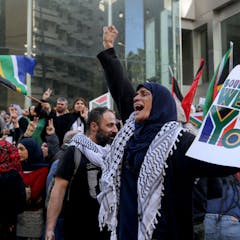
Articles on Israel-Palestine
Displaying 1 - 20 of 247 articles

Canadian universities’ requests for court orders and police enforcement to clear Palestine solidarity encampments raise questions about the legal status of encampments and the use of injunctions.

There have been plenty of shocking images, shareable graphics and heartbreaking stories of the conflict shared to social media. So why has this particular image gone viral?

Recognition of Palestinian statehood was previously held out as an incentive to completing peace negotiations. But that’s changed now, and New Zealand should consider changing its position too.

How university campuses respond to concerns about student safety can set the stage for learning or encourage its opposite: divisiveness and censorship.

Throughout the 1960s and 1970s, conservative activists led a counterattack against campus antiwar and civil rights demonstrators by demanding action from college presidents, the courts and the police.

Ontario’s Strengthening Accountability and Student Supports Act threatens to undermine university autonomy, and could serve to censor critical thinking and dissent on campuses.

The government’s rhetoric in response to the death of the Australian aid worker is stronger than we’d previously seen, but in a conflict with no clear solutions, little will change.

Secular Jewish groups have historically made up the majority of solidarity and peace groups. But Palestinian citizens and observant Jews are also key.

Instead of voting on a ceasefire, the House of Commons descended into furious arguments between MPs and the speaker.

A changing world order and global battles for power will derail the quest for peace in Gaza and the Middle East.

The International Court of Justice has heard arguments from each side of an extraordinary genocide case. What was said, and what happens now?

Today, hearings will begin in the International Court of Justice, where South Africa is accusing Israel of genocide in Palestine. How will the proceedings work, and what does it mean for the war?

The mistaken killing of three Israeli hostages by the Israeli Defense Forces at the weekend has substantially increased pressure on Prime Minister Benjamin Netanyahu to accept a ceasefire.

A scholar of the Islamic State group says Hamas has undergone a radical ISIS-inspired transformation that has not yet gotten widespread public attention.

Around 50% of those under 30 supported Biden’s policy on Israel, a higher number than other age groups.

President Cyril Ramaphosa’s messages, and tone of delivery, suggest an assertive leader representing the interests of the global south.

East Africa’s reaction to the war in Gaza appears shaped by history, affinity to the policies of the west and the threat of terrorism.

The European bourgeoisie could not forgive Hitler because he applied in Europe colonialist procedures previously reserved for the supposedly inferior Arabs, Indians, and Africans.

Calls for a cease-fire in Gaza are driven by humanitarian compassion and principles. But cease-fires are also technically complicated military and political ventures.

At present the Israeli prime minister, Benjamin Netanyahu, has ruled out a ceasefire but may allow ‘little pauses’.
